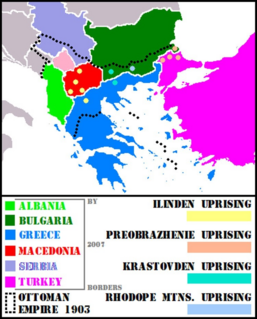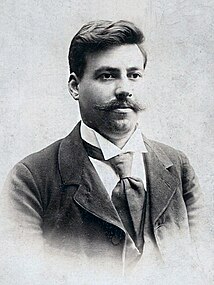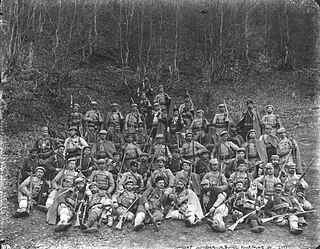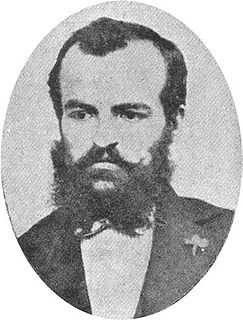
The Internal Macedonian Revolutionary Organization was a revolutionary national liberation movement in the Ottoman territories in Europe, that operated in the late 19th and early 20th centuries.

The Ilinden–Preobrazhenie Uprising, or simply the Ilinden Uprising of August 1903, was an organized revolt against the Ottoman Empire, which was prepared and carried out by the Internal Macedonian-Adrianople Revolutionary Organization. The name of the uprising refers to Ilinden, a name for Elijah's day, and to Preobrazhenie which means Transfiguration. The revolt lasted from the beginning of August to the middle of October and covered a vast territory from the eastern Black Sea coast to the shores of the Lake Ohrid.

Georgi Nikolov Delchev, known as Gotse Delchev, also spelled Goce Delčev, Cyrillic: Гоце Делчев, originally spelled in older Bulgarian orthography: Гоце Дѣлчевъ; was an important revolutionary figure (komitadji) in Ottoman-ruled Macedonia and Thrace at the turn of the 20th century. He was the most prominent leader of what is known today as Internal Macedonian Revolutionary Organization (IMRO), a paramilitary organization active in Ottoman territories in the Balkans, at the end of the 19th and the beginning of the 20th century. Delchev was its representative in Sofia, the capital of Principality of Bulgaria.

The Macedonian Struggle or the Greek struggle for Macedonia, or according to the Bulgarian point of view Greek armed propaganda in Macedonia was a series of social, political, cultural and military conflicts that were mainly fought between Greek and Bulgarian subjects who lived in Ottoman Macedonia between 1893 and 1908. The conflict was part of a wider rebel war in which revolutionary organizations of Greeks, Bulgarians and Serbs all fought over Macedonia. Gradually the Greek & Bulgarian bands gained the upper hand, but the conflict was ended by the Young Turk Revolution in 1908.

Damyan Yovanov Gruev or Damjan Jovanov Gruev, often known by his short name Dame Gruev, was а Bulgarian teacher, revolutionary and insurgent leader in Ottoman regions of Macedonia and Thrace. He was among the founders of the Internal Macedonian Revolutionary Organization. Despite his Bulgarian self-identification, according to the post-World War II Macedonian historiography, he was an ethnic Macedonian.

Hristo Tatarchev was a Bulgarian doctor and revolutionary, the first leader of the revolutionary movement in Macedonia and Adrianople Thrace. He wrote a memoirs called The First Central Committee of the IMRO (1928). Tatarchev authored several political journalism works between the First and Second World War. According to post-WWII Macedonian historiography, he was an ethnic Macedonian.

Gyorche Petrov Nikolov born Georgi Petrov Nikolov, was a Bulgarian revolutionary, one of the leaders of the Macedonian-Adrianople revolutionary movement. Despite his Bulgarian self-identification, according to the post-World War II Macedonian historiography, he was an ethnic Macedonian.

Todor Aleksandrov Poporushov also transliterated as Todor Alexandrov also spelt Alexandroff was a Bulgarian fighter for freedom of Macedonia and member of the Bulgarian Macedonian-Adrianople Revolutionary Committees (BMARC) and later of the Central Committee of the Internal Macedonian Revolutionary Organisation (IMRO).

Petar Pop-Arsov, originally spelled in older Bulgarian orthography: Петъръ попъ Арсовъ; was a Bulgarian educator and revolutionary from Macedonia, one of the founders of the Internal Macedonian Adrianople Revolutionary Organization (IMARO), known in its early times as Bulgarian Macedonian-Adrianople Revolutionary Committees (BMARC). Although he was Bulgarian teacher and revolutionary, and thought of his compatriots as Bulgarians, according to the post-WWII Macedonian historiography, he was an ethnic Macedonian.

Dimitar Yanakiev Vlahov was a politician from the region of Macedonia and member of the left wing of the Macedonian-Adrianople revolutionary movement. As with many other IMRO members of the time, historians from the North Macedonia consider him an ethnic Macedonian and in Bulgaria he is considered a Bulgarian. Vlahov declared himself until the early 1930s as a Bulgarian and afterwards as an ethnic Macedonian. However such left-wing Macedonian activists, former members of the BCP and the IMRO (United) never managed to get rid of their strong Bulgarophile sentiments, and thus practically continued to feel themselves as Bulgarians even in Communist Yugoslavia.

Bulgarian Constitutional Clubs was an ethnic Bulgarian political party in the Ottoman Empire, created after the Young Turk Revolution, by members of the Internal Macedonian Adrianople Revolutionary Organization. The party functioned for a little over a year - from September 1908 until November 1909. Its main political rival was the Peoples' Federative Party.

Hristo Dimitrov Uzunov was a Bulgarian teacher and revolutionary, head of the Ohrid branch of the Internal Macedonian Revolutionary Organization and its ideological leader in the Ohrid region. Despite his Bulgarian self-identification, according to the post-WWII Macedonian historiography, he was an ethnic Macedonian.

Yordan Piperkov (1870–1903) ;, widely known as Yordan Piperkata, was a Bulgarian revolutionary from the early 20th century, member of the Internal Macedonian-Adrianople Revolutionary Organization (IMARO). According to the post-WWII Macedonian historiography, he was an ethnic Macedonian.

Petar Dimitrov Angelov was a Bulgarian military officer and a revolutionary, a member of the Internal Macedonian-Adrianople Revolutionary Organization (IMARO).
Hristo Apostolov Matov was a prominent Macedonian Bulgarian revolutionary, philologist, folklorist and publicist and one of the leaders of the Bulgarian Macedonian-Adrianople Revolutionary Committees,.

Mihail Gerdzhikov was a Bulgarian revolutionary and anarchist.

The Macedonian Secret Revolutionary Committee(MSRC) was founded in 1895 in Plovdiv. It was developed later in Geneva in a secret, anarchistic, brotherhood called "Geneva group".

Metody Patchev was a Bulgarian revolutionary, vojvoda of the Internal Macedonian-Adrianople Revolutionary Organization. According to the Macedonian historiography, he was an ethnic Macedonian.
The Temporary representation of the former United Internal Revolutionary Organization was a short-lasted organization founded by former members of the Internal Macedonian-Adrianople Revolutionary Organization, created in 1919 on the wake of the Paris Peace Conference after the World War I in Sofia. The left wing of IMARO, disturbed by the organization's increasing domination by the pro-Greater Bulgaria Vrhovists, founded this Organization, aimed to avoid the partitition of the region of Macedonia. It included Gyorche Petrov, Dimo Hadzhidimov, Petar Atsev, Hristo Tatartchev, Petar Pop Arsov, Mihail Gerdzhikov etc. The Organization issued a memorandum and send it to the representatives of the Great Powers on the Peace conference in Paris. There the Temporary representation advocated for autonomy of Macedonia as a part of a future Balkan Federation. It threatened the autonomous Macedonia as state populated by different people as Bulgarians, Greeks, Serbs, Turks, Vlahs, etc. In the parliamentary and local elections of 1919, the Temporary representation supported the candidates of the Bulgarian Communist Party. The BCP sought to take the Organization over, in fact to transform it into its own section. Following the signing of the Treaty of Neuilly and the partition of Macedonia, the activity of the Temporary representation faded. In 1920 it was dissolved and most from its members joined the Bulgarian Emigrant Communist Union. Other members joined a number of different leftist organizations. They all were opposed to the restoration of IMARO as a Bulgarian nationalist organization under the name IMRO, headed by Todor Alexandrov. Subsequently, most of them were killed in the strife among the Macedonian revolutionaries. At least until the middle of the 1920s, the former IMRO-left was not a united movement, unlike the right wing. In 1925 the most of its survivors joined the Internal Macedonian Revolutionary Organization (United).

Autonomy for the region of Macedonia and Adrianople Thrace within the Ottoman Empire was a concept that arose in the late 19th century and was popular until ca. 1920. The plan was developed among Macedonian and Thracian Bulgarian emigres in Sofia and covered several meanings. Serbia and Greece were totally opposed to that set of ideas while Bulgaria was ambivalent to them. In fact Sofia advocated granting such autonomy as a prelude to the annexation of both areas, as for many Bulgarian emigres is was seen in the same way.
















